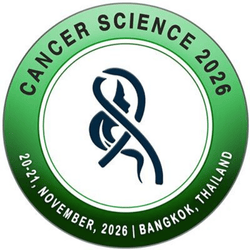Track: Cancer Biology and Genetics

Cancer cells exhibit abnormal behavior compared to normal cells. These include uncontrolled growth, resistance to cell death, and the ability to invade surrounding tissues. Understanding these changes is crucial for developing targeted therapies that specifically address cancerous cell functions.
Genetic Mutations and Cancer
Genetic mutations, particularly in oncogenes and tumor suppressor genes, are key drivers of cancer. Mutations in genes like TP53, BRCA1, and KRAS can lead to uncontrolled cell division and tumor formation, highlighting the importance of genetic testing for cancer risk and therapy decisions.
Tumor Suppressor Genes and Oncogenes
Oncogenes promote cancer cell growth, while tumor suppressor genes inhibit it. Mutations in these genes disrupt normal cellular processes. Understanding the roles of genes like HER2 cancer, BRCA, and p53 is essential in cancer diagnosis, prognosis, and treatment planning.
Genomic Instability in Cancer
Cancer cells often exhibit genomic instability, leading to an accumulation of mutations that drive cancer progression. This instability can be linked to defects in DNA repair mechanisms, making cancer cells more vulnerable to certain types of treatments, such as chemotherapy and radiation.
Cancer Epigenetics
Epigenetic modifications (such as DNA methylation and histone modification) influence gene expression without altering the DNA sequence. These modifications play a crucial role in cancer development, and epigenetic therapies are being explored to reverse abnormal gene expression patterns in cancer cells.
Scientific Highlights
- Cancer Research
- Types of Cancer
- COVID 19 Impact on Cancer
- Screening & Diagnosis for Cancer
- Cancer Biology and Genetics
- Theraphies for Cancer Treatment
- Cancer and Oncology Nursing
- Molecular Pathways and Signaling
- Breast Cancer and Treatments
- HER2 Positive Breast Cancer
- Breast Cancer Surgery
- Radiology and Oncology
- Oncology Nursing & Patient Care Models
- Palliative & Supportive Oncology Care
- Advances in Breast Cancer Immunotherapy
- Liquid Biopsies in Early Cancer Detection
- Robotic Assisted Breast Cancer Surgery
- Triple Negative Breast Cancer (TNBC)
- Genomics and Cancer Biomarkers
- Artificial Intelligence in Cancer Prognosis
- Precision Onco-Urology


